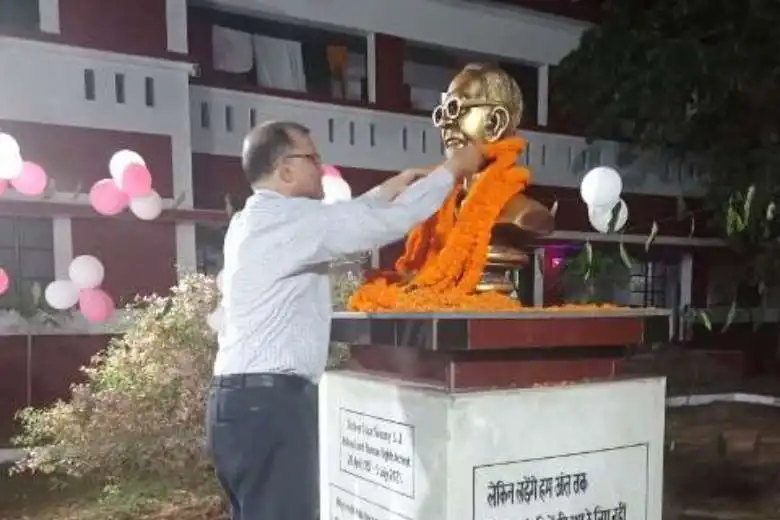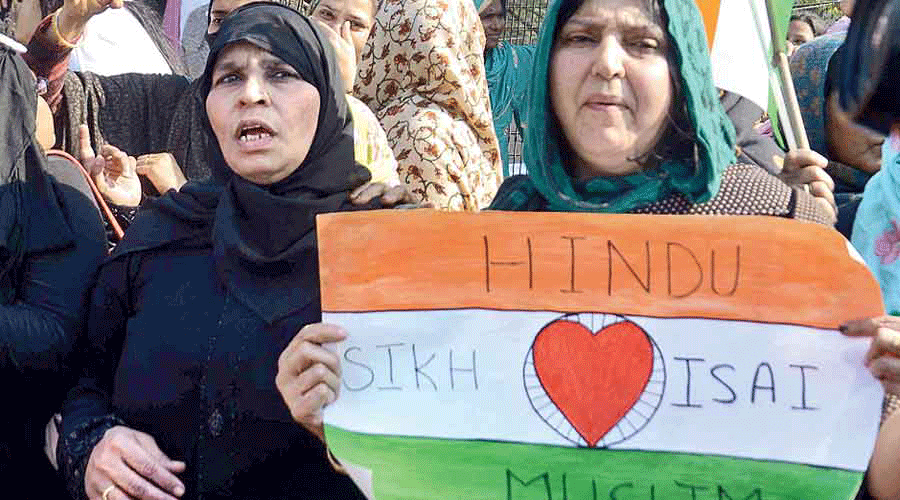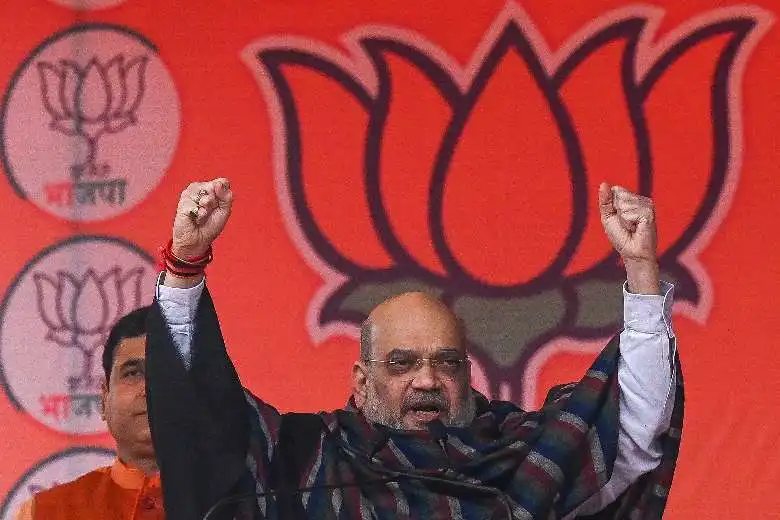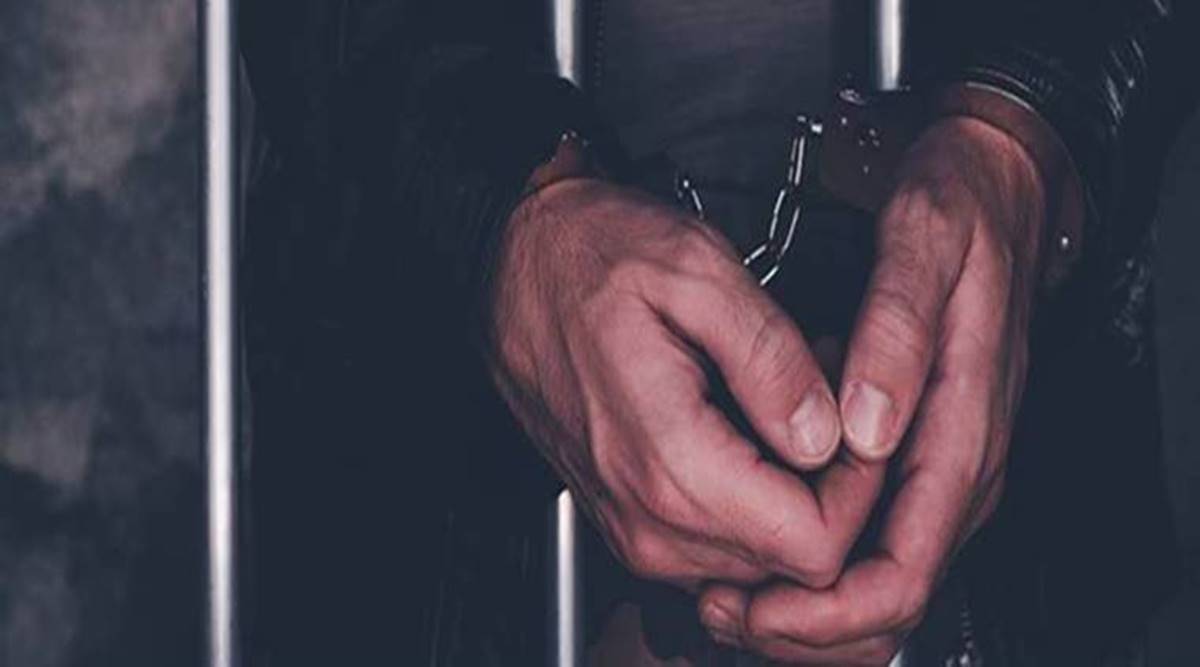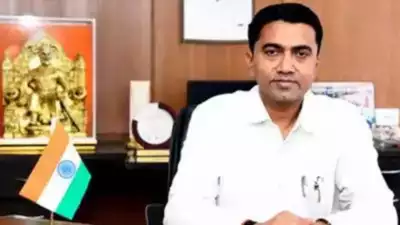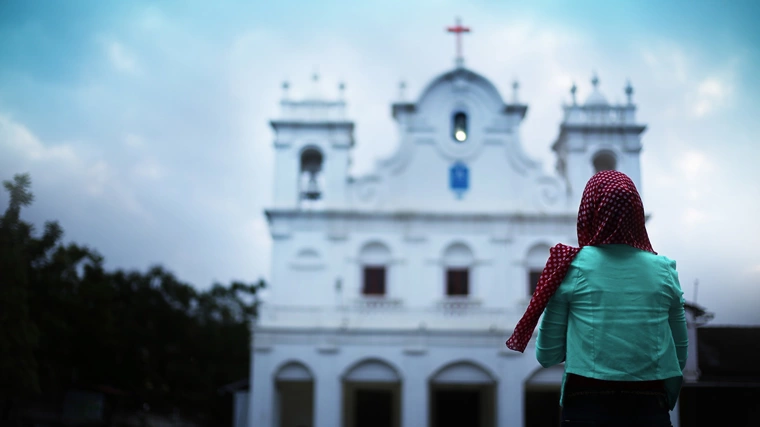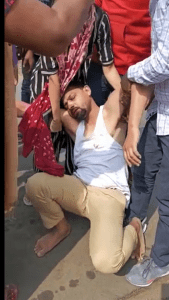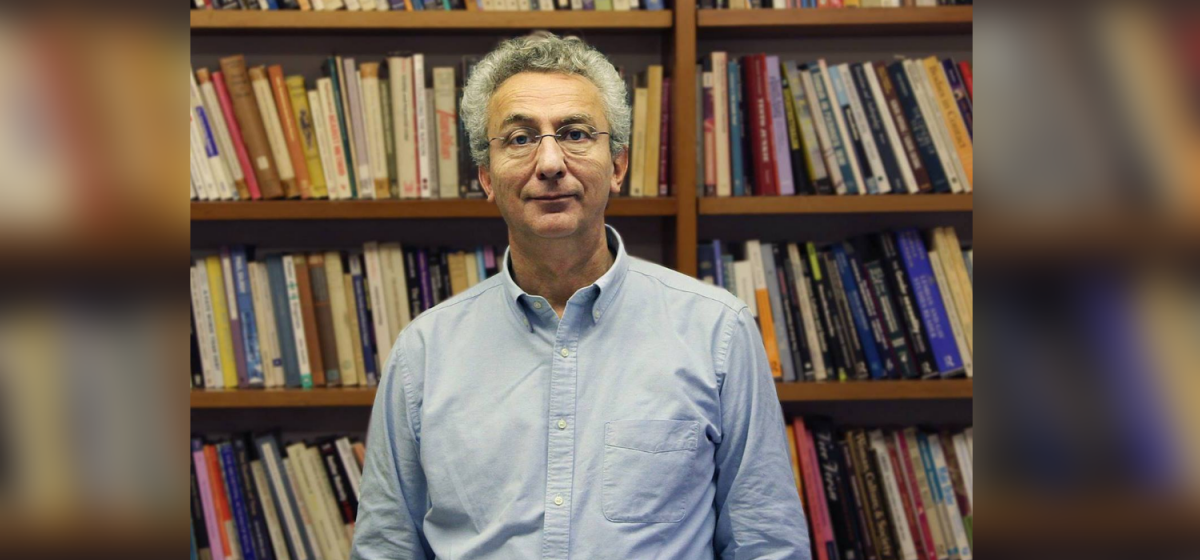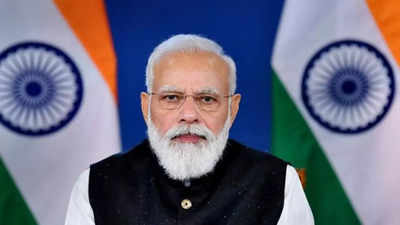Indian Jesuit’s martyrdom recalled on his birth anniversary
Father Stan Swamy, who stood with tribal people to oppose exploitative policies, died in judicial custody in 2021 Indian Jesuit's martyrdom recalled on his birth anniversary Father Denzil Fernandes, director of the Jesuit-run Indian Social Institute in New Delhi, garlands the bust of Father Stan Swamy on his birth anniversary in Ranchi, Jharkhand, on April 26. (Photo supplied) The 85th birth anniversary of Father Stan Swamy, the first since his death, was observed with the release of a book and unveiling of his bust at Bagaicha, a training and social action center he founded in the eastern Indian state of Jharkhand. Elsewhere in the country, members of the Indian Church and civil society remembered the martyred Jesuit’s contributions to upholding the human rights of the most marginalized sections of society. The main event was held at Bagaicha in Namkum, Ranchi, on April 26 where the two-foot-high bust of Father Stan stands tall overlooking the institution he founded in 2006. Keeping his memory alive, Bagaicha continues to empower individuals and organizations working against the displacement of marginalized people, human rights violations, illegal land acquisition and confinement of tribal people by branding them as Maoists. Also released on the occasion was the Hindi version of the priest’s memoir
US panel again recommends India as ‘country of particular concern’
For the third straight year, the United States Commission on International Religious Freedom has recommended to the state department that it designate India as a “country of particular concern”, where the government “engages in or tolerates ‘particularly severe’ violations of religious freedom”. The designation is reserved for the worst violators of religious freedom; Pakistan, Saudi Arabia, Iran, North Korea and Russia are also designated as CPCs Both the Joe Biden and Donald Trump administrations had in 2021 and 2020, respectively, ignored the commission’s recommendation to designate India as a country of particular concern (CPC). The commission is an independent, bipartisan US federal government agency created by the 1998 International Religious Freedom Act (IRFA). India did not react immediately to the latest recommendation, made in the commission’s annual report for 2022, released on Monday. The designation “CPC” is reserved for the worst violators of religious freedom. Currently, 10 countries including Pakistan, Saudi Arabia, Iran, North Korea and Russia are designated as CPCs. Four other countries have received the CPC recommendation along with India: Afghanistan, Nigeria, Syria and Vietnam. The purpose of such a recommendation is to focus US policymakers’ attention on the worst violators of religious freedom globally. For countries designated as CPCs, the IRFA provides the US
A strong push for a Hindi-speaking, Hindu India
Hindi as the national language suits the BJP's wider agenda of establishing a nation of and for Hindus A strong push for a Hindi-speaking, Hindu India Home Minister Amit Shah gestures during an election rally in Uttar Pradesh on Feb. 3. Federal Home Minister Amit Shah, a trusted aide of Prime Minister Narendra Modi, has come all out in support of Hindi as the official language of communication across a multilingual India. Hindi is the mother tongue of around 40 percent of Indians in the northern belt while the rest of its citizens speak over 120 other languages, with English serving as the crucial bridge. Shah made it clear that Hindi should become an “alternative to English” and not the other Indian languages. He wants non-Hindi speakers to start using Hindi while communicating with each other. He also suggested making Hindi flexible by accepting words from other Indian languages to help propagate it. Leaders from Hindi-speaking northern India have been pushing to make Hindi the national language for a long time, hoping to further endear themselves to their voters. But Shah’s remarks at a recent meeting of the parliamentary official language committee are a bit baffling. There is perhaps a communal angle here. The Bharatiya Janata
26 held for unlawful religious conversion in Fatehpur: Cops
The arrests were made after a raid was carried out at a church in the Hariharganj area on the information provided by members of a Hindu organisation, it is learnt. Fatehpur, Uttar Pradesh, Uttar Pradesh news, Uttar Pradesh Police, Religious conversions, unlawful religious conversion, Indian Express, India news, current affairs, Indian Express News Service, Express News Service, Express News, Indian Express India News. All those arrested were later bailed out. The drive against bootleggers was also conducted on Friday night. (File) Twenty six persons were arrested on Friday for alleged illegal religious conversions in Uttar Pradesh’s Fatehpur district, police said. The arrests were made after a raid was carried out at a church in the Hariharganj area on the information provided by members of a Hindu organisation, it is learnt. Besides the anti-conversion law, the police also invoked charges of promoting enmity between two groups against the accused. “Those arrested, all men, were produced in a local court in Fatehpur. The court dropped anti-conversion charges since the complainant was not party to the alleged conversion as the case was filed by a Hindu organisation member. The court granted bail to nine persons while others were sent to jail,” said circle officer (city) Dinesh Chandra
Won’t allow religious conversions in Goa: CM Pramod Sawant
Goa CM Pramod Sawant also called upon people to be alert about religious conversions and said, “The temple committees should also keep watch”. PANAJI: Chief minister Pramod Sawant said on Friday that his government would not allow any religious conversions in the state. “In different parts of the state, people are taking advantage of poor belonging to minority and backward communities, who are unemployed and striving for food and doing religious conversions. Such religious conversions should not take place even by mistake and my government will not allow it,” Sawant said at an idol installation ceremony at Kudnem temple in Bicholim taluka. He also called upon people to be alert about religious conversions and said, “The temple committees should also keep watch”. Referring to the Portuguese rule, Sawant said: “Sixty years ago we believed in dev (god), dharma (religion) and desh (nation). It was believed that if god is protected, then religion will be protected and if religion is protected, then nation will be protected. With these sentiments people of Goa migrated to places with the idols of gods.” He said after 60 years, people are once again making an effort to visit the places from where they were displaced, to try and find their
‘Never-Before-Seen Majoritarian Aggression’: English Editorials Call Out BJP-Aided Hatred
Almost all English newspaper editorials in the past three days have focused singularly on communal disharmony – some explicitly pivoting to Blinken's rebuke of India's human rights situation. 'Never-Before-Seen Majoritarian Aggression': English Editorials Call Out BJP-Aided Hatred A collage of English newspaper editorials on hatred and disharmony in India. New Delhi: A day ago, news that the US Secretary of State Antony Blinken had said that the United States was monitoring “a rise in human rights abuses in India by some officials,” was shared widely on social media. “We regularly engage with our Indian partners on these shared values (of human rights) and to that end, we are monitoring some recent concerning developments in India including a rise in human rights abuses by some government, police and prison officials,” Blinken said. News outlets recognised the fact that such a direct rebuke by the US was rare. Several pointed to current events that may have warranted such a comment, even though Blinken did not mention any. Almost all English newspaper editorials in the past three days have focused singularly on communal disharmony – some explicitly pivoting to the Blinken fallout while others have explored the policing of food and the act of policing itself. ‘A constant simmer’ Indian Express
761 acts of violence committed against Indian Christians in 2021, new report finds
A federation of Indian American Christian groups says it documented at least 761 incidents of violence against Christians, including lynching and armed assaults last year. It is recommended that the U.S. and European governments impose sanctions on officials who promote violence and exclusion of religious minorities. “The year 2021 has proven to be the most violent year for Christians in India,” said John Prabhudoss, the chairman of the Federation of Indian American Christian Organizations of North America, at a press conference in Washington, D.C., this week. Prabhudoss said FIACONA documented and analyzed all the 761 incidents, adding that the number of anti-Christian attacks is likely to be much higher because most of the incidents are not reported. Christians and other minorities, he explained, do not trust the police, especially in rural areas. “The current hostile environment in India amplifies that distrust.” Prabhudoss added that a survey by FIACONA in states where the Hindu nationalist Bharatiya Janata Party is governing showed that 72% of Christians believe that the police will not protect their lives, liberty, property or their way of life. The report by FIACONA said India’s judiciary is also not viewed as being independent and impartial. “The higher courts in India have been passing judgments favoring
Assaulted Pastor in India Faces Baseless Charges, Death Threats
NEW DELHI (Morning Star News) – Still recovering from injuries at the hands of a Hindu extremist-led mob that beat him unconscious in January, a pastor in central India faces death threats, landlords who refuse to rent to him and baseless charges of forcible conversion, sources said. “Kailash Dudwe was brutally assaulted to the extent of almost being killed, was stripped and paraded on the street with grievous injuries, was hospitalized for a fortnight, a warrant issued against him and sent to jail,” said Anar Singh Jamre, a Christian leader in Pastor Dudwe’s area of Dhar District, Madhya Pradesh. Hindu extremists led a mob of more than 20 people to attack Pastor Dudwe and six other Christians – his wife, a 16-year-old girl and four men – who had gathered to pray at his church site in Kukshi village on Jan. 14, he said. With his 1-year-old baby nearby, the assailants tried to hit his 5-year-old daughter with an iron bar, he said. “My wife caught the rod and stopped it from hitting our daughter,” Pastor Dudwe said. “I still get terrified at the thought of their brutality, that they showed no mercy towards my little girl.” The 16-year-old girl picked up his son
Anthropologist Filippo Osella Deported After Arriving at Kerala Airport; No Reasons Cited. The UK academic, was to attend a conference in India on Friday.
(Read the story on The Wire) New Delhi: Filippo Osella, a well-known anthropologist and sociologist, who arrived at Thiruvananthapuram international airport from the UK on Thursday, March 24, morning to attend a conference in the city was deported to his home country with authorities specifying no particular reason for the same, Indian Express has reported. Osella, who has carried out extensive research on social and cultural transformations in Kerala over the last 30 years, was touted as the face of the conference to be held on Friday in the city on “emerging themes connected to the livelihood and lifeworld of Kerala coastal communities”. When asked about Osella’s deportation, an immigration officer at the Foreigners Regional Registration Officers (FRROs) in Thiruvananthapuram airport said the reason for his deportation cannot be revealed. “He was denied entry as per the orders from higher officials. No reason can be revealed,” the officer said. According to Osella, he was told to contact flight assistants when he reached Thiruvananthapuram airport on an Emirates flight on Thursday morning. He was then led to a person who was waiting for him outside. “I was taken to the immigration desks, and processed as it is normally done. But after they scanned my passport, took my
Ministry of Home Affairs Extends Till June 30 Validity of FCRA Registered NGOs’ Licences.
Read it on The Wire here: New Delhi: The Union home ministry on Thursday extended till June 30 the validity of all FCRA registered NGOs whose licences are going to expire at the end of this month and those whose applications are pending for approval. In a notification, the home ministry said the decision has been taken in public interest. According to the home ministry, the validity of the registration certificates of such entities whose validity was extended till March 31 and whose renewal application is pending will stand extended till June 30 or till the date of disposal of renewal application, whichever is earlier. The validity of those FCRA entities whose five years validity period is expiring during April 1 to June 30 and which have applied or apply for renewal before expiry of 5 years validity period will stand extended up to June 30 or till the date of disposal of renewal application, whichever is earlier, it said. The home ministry advised all FCRA registered associations to take note that in case of refusal of the application for renewal of certificate of registration, the validity of the certificate shall be deemed to have expired on the date of refusal of the application of





